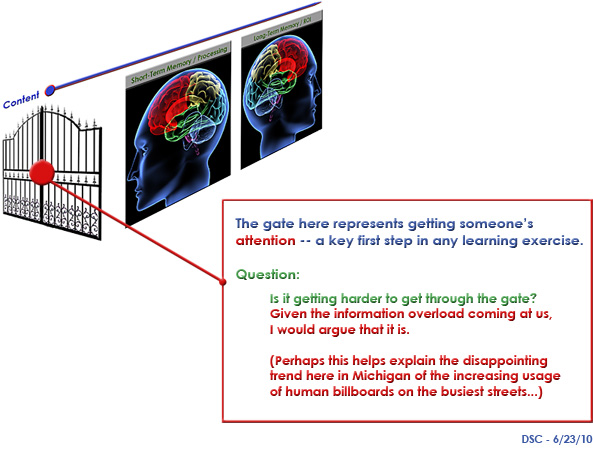From DSC:
As we begin a new academic year, several questions and thoughts come to my mind…such as:
- Will this be the year we really start seeing a visible/tangible change in the incoming freshmen at our college in terms of how they prefer to learn? What it takes to keep them engaged? How to best adapt to their use of technology? (Perhaps you’ve seen changes in students’ preferences/styles at your college or university long ago…)
- Or are the changes happening so slowly that it’s like looking in the mirror? (i.e. we can’t see changes on a daily basis…but if we look at photographs from 5-10 years ago, we can see the changes)
- Or are we not there yet?
- Or is all this talk about students’ use of technology a bunch of hype from the vendors trying to make a buck?
.
- Control
- Much of what influences students within K-12 and higher education is out of our control. Therefore, much of what needs to change in higher ed is not in our control.
- What is in our control is taking pulse checks on trends, student expectations / preferences…and then making plans and executing those plans as to how we want to respond to those changes
.
- What adjustments do we need to make in the next 1-5 years? 5-10 years?
- Should we be offering more cross-disciplinary assignments/courses? More project-based learning?
- Should we be offering more multimedia-based materials, available 24x7x365? Or would students not even use these materials if we made the effort to put them out there?
- Should we change what we want to achieve within our face-to-face times?
- How do we best prepare our students for jobs that haven’t yet been created?
- Given the higher costs involved, what’s the balance between more traditional liberal arts and more vocationally-based curriculums/offerings?
.
- Preferences / attention spans
- Are there changes in how students prefer to learn?
- Is it getting harder to get through “the gate” (i.e. gaining someone’s attention to get into someone’s short-term and long-term memory)? If so, what do we want to do about that, concretely speaking?









